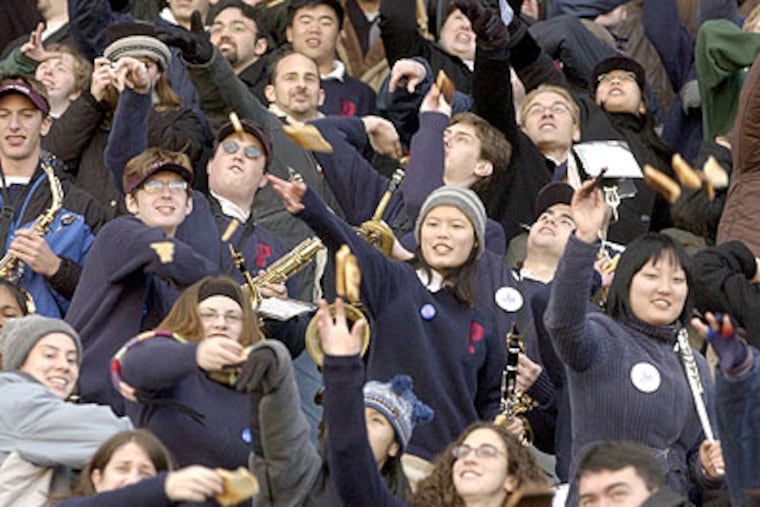
By Pranav Merchant
The University of Pennsylvania's first home football game is this weekend, and it will no doubt feature the traditional singing of "Drink a Highball" at the end of the third quarter. At one time, it was also tradition to take a swig of beer upon reaching the line of the song that calls for "a toast to dear old Penn."
After alcohol was banned from the stadium in the 1970s, students began marking that line by throwing toast onto the field instead. This tradition came to be known as the Toast Toss, and it continues to this day. Innocent, alcohol-free college fun, right?
Wrong. Penn has replaced consuming alcohol with wasting loaves and loaves of perfectly edible bread, all in the service of a play on words.
Students fling about $500 worth of bread onto the field per game, all funded by the school and sponsors. Some students add their own toast to the total, but most of it is provided by the Penn staff. (You can watch the toss yourself in numerous videos on the Web.)
What happens to all this toast? It's tossed again - into the garbage. In other words, every year, the university is trashing a massive amount of food.
nolead begins
Poverty and excess
This is a cavalier and startling display, especially in Philadelphia, where almost a quarter of the population and a third of the children live in poverty. Indeed, St. Mary's Episcopal Church and Penn Hillel maintain food pantries on campus.
This creates a dichotomy: On the West Philadelphia side of campus, there is poverty; on the Center City side, where the football stadium is, there is excess. And the university is not only allowing this irresponsible waste; it's supporting it.
The toss' defenders note that it promotes camaraderie among students and happens only five times a year. Moreover, the university attempts to mitigate the waste by donating the cash value of the bread to local food pantries. Penn athletes also work to alleviate poverty and hunger through community service and outreach.
This year, Penn Athletics plans to solicit donations to charity during every home football game, hold a food drive during one of them, and send the tossed toast to a composting facility.
All of this is commendable, but none of it changes the fact that the Toast Toss is a substantial waste of food. By forgoing $2,500 worth of projectile bread every year, Penn could put $5,000 into hunger relief instead of $2,500, feeding twice as many people. Thanks to the Toast Toss, though, that money is effectively being thrown away.
I understand that traditions die hard, and, as Joshua Craggs of the Athletics Department noted, the Toast Toss is one of the few traditions Penn has. But those who would continue the toss on those grounds should consider its origin: A ban on another tradition. The Toast Toss isn't some sacred rite dating to time immemorial; it started in the 1970s.
If one tradition ended so recently, another can, too - especially if it's for a good reason. Instead of using real bread, students could throw foam or plastic bread. They could toast dear old Penn with nonalcoholic beverages. Or they could make a home-game food drive the new tradition.
nolead begins
Pampered brats?
A society may be judged by its traditions, and the Toast Toss suggests that Penn students are pampered brats who are fundamentally out of touch with Philadelphia's poverty and ignorant of the value of the food they're wasting. It suggests that the university and its students are so rich that they can purchase huge amounts of food and throw it away for the sake of a joke.
Of course, the university is serious about helping Philadelphia's disadvantaged. One of many examples of its good work is the fall course "Ending Hunger in Philadelphia," in which students develop plans to alleviate hunger in the city.
It's precisely because of the Penn community's conscientiousness that it should stop squandering food in this ridiculous tradition. Until it does, its actions and intentions won't be in harmony.